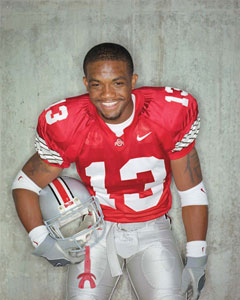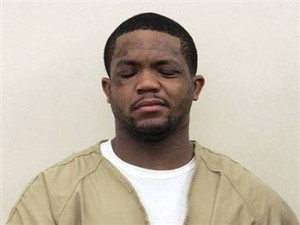Youngstown Boys explores class and power dynamics in college sports through the parallel, interconnected journeys of one-time dynamic running back Maurice Clarett and former elite head coach Jim Tressel. Both emerged from the working-class city of Youngstown, Ohio—Tressel as the head coach who turned around the football program at Youngstown State—before they joined for a magical season at Ohio State University in 2002 that produced the first national football championship for the school in over 30 years.
And of course, how scandal destroyed both of them. It mostly focuses on Maurice Clarett. Way more than Tressel. It shows the journey of how Maurice Clarett became OSU hero, to Ohio State persona non grata to in and out of prison to current Ohio St. student and again waver of the scarlet and grey flag on social media.
For a review of the Jim Tressel 30 for 30 “Youngstown Boys” go here
For an interview/update on what Maurice Clarett is up to go here.
For an interview/update on what Jim Tressel is up to go here
I was on the media conference call with Maurice Clarett, Tressel and the directors of Youngstown Boys. I believe these three questions and responses from Maurice Clarett, (you can guess which question was mine) best summarize who Maurice Clarett really is.
Q. This is basically for Maurice Clarett. I just wonder, was it cathartic to open up, or now that you’ve seen your whole life kind of put together, is it hard to look at, or just how was that?
Maurice Clarett: I kind of got past that point. Initially I didn’t want to do anything with the film. I mean, because you’re not sure if the people involved will be responsible with the information that you give them, seeing as it’s about your life. But after watching the body of work that they did with “The Two Escobars” and after watching the things that they sort of did with us, I loved the film from an artistic standpoint. And just looking at it from that standpoint, I was just kind of convinced after just meeting them and getting a feel over having a basic conversation, I had been to prison, so you can kind of think on people’s intentions or subtleties so much.
But after having an initial meeting with them and feeling for them, I understood that their intentions were kind of like pure and free, and they’re kind of like in their own little world, kind of like in their own little space. I don’t call it weird to say they’re kind of free just to kind of independently do what they want to sort of, so that kind of attracted me to it.
But actually seeing everything, it was things that really took place in my life. It was things that really happened, some of the stuff you’re proud about, some of the stuff you’re not, but it’s the truth of what took place. We started to realize that I was once in that place, and I’ll say when I was in college and I was just confused, I had no idea what to do. I mean, I was in a place where I had to make decisions that would basically affect the rest of my life, and I was making them all based upon emotions, and these times would very seriously affect my future, but when you realize you have a chance to express yourself and express your life and see how you navigated through the whole thing, not navigating like you would like to at all times but knowing that the story can potentially help more people and actually getting out here and speaking to them and meeting people, and seeing that people draw inspiration from you or hope from you or things like that, you start feeling responsible to bring more out of yourself.
I had a bunch of people in my corner throughout the process that made it easier. So all in all, it didn’t hurt our ?? initially it was hard, but after a while you kind of got used to it or you kind of got comfortable with the people that was receiving information. And based upon specifically the question, when I kind of sat down and were talking to them you could kind of see where their intentions were at. They weren’t just set on just slamming somebody. They were just telling an independent story saying, hey, this is kind of what took place, this is what really went on, and then the people who will view it can kind of take what they take from it.
Q. My question is for Maurice Clarett. Do you think that your story and perhaps the film will kind of help inspire change within the NCAA down the line, that maybe perhaps one day players will get paid and that players will have a chance to leave early and go to the NFL or the NBA if they so choose to? Do you think your film actually might inspire others to work towards making that happen perhaps?
Maurice Clarett: I don’t know. I didn’t make the film for it to be a stage for young guys to get paid. That’s probably a different forum, a different conversation. Outside of getting paid, I think it’s just a lot of things that you can do to help student athletes just as people, and not so much look at them just as kids who are out on the football field.
I know often times their development as a person, some being from the backgrounds that they’re coming from or being from the cultures that they’re coming from, and this is not just an urban thing but it’s also reached suburban American, but just basically to make better individuals. I think paying players or compensating them is a totally different conversation, and you have people who are much smarter than me who can have a better conversation with you about that.
I’m not sure I’m allowed to chime in whether they ever did have a conversation, but with me I didn’t make it for that reason or I don’t advocate or go against anything like that, but if the NCAA would sit down with me, I could figure out a whole lot of ways to help these guys who seem to drive so much business toward the school just because I see a lot of guys who don’t make it to the NFL who come out of it at the end and they’re struggling with life. And even with the guys who do happen to go to the NFL and their careers are done, I see those guys struggle. But like with them, even now these days in modern?day America, I think Coach Tressel or any coach across America, they’ll pretty much say the same thing. There’s a lot you can do for these guys and the approach in helping them develop as people. I care more about those things than anything else. I know you can pay these guys, but if you pay them and then you throw them out to the world or they don’t know how to operate or take care of themselves, what’s the point or what’s the meaning. It’s like you’re just putting a Band?Aid on the situation.
But I’m just like prepare these guys better for life, but that’s a bigger conversation in an entirely different forum.
Paul M. Banks is the owner of The Sports Bank.net, an affiliate of Fox Sports. He’s also an analyst for multiple news talk radio stations across the country; with regular weekly segments on NBC and Fox Sports Radio. Follow him on Twitter (@paulmbanks) and RSS Catch him Tuesdays talking Illini and Northwestern for KOZN 1620 The Zone, Fridays talking Chicago Bears for WAOR 95.7 The Fan



